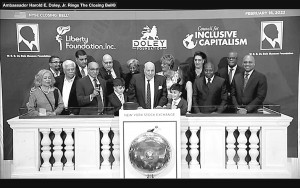New Orleans native, Harold Doley Jr. honored by NYSE
2nd March 2022 · 0 Comments
By Fritz Esker
Contributing Writer
Ambassador Harold Doley Jr., who became the first Black person to purchase a seat on the exchange in 1973, rang the closing bell at the New York Stock Exchange on February 18.
Doley, a New Orleans native, was joined at the event by executives from Liberty Bank and Trust. The Liberty Bank and Trust Company was less than one year removed from receiving its charter to operate as a financial institution when it backed Doley’s efforts to purchase his seat on the exchange.
Doley’s investment banking career began in 1968. He traced his interest in investment banking to a summer trip he took with his father to New York City. There, they visited the floor of the New York Stock Exchange.

Amb. Harold E. Doley Jr., center, is surrounded by family members and friends as he rings The Closing Bell at the New York Stock Exchange on Friday, February 18 in celebration of his 50th Anniversary of membership on the NYSE. Doley, a New Orleans native, was the first Black to buy a seat on the New York Stock Exchange. He founded Doley Securities LLC in 1975.
“My father made me aware of how money and power relate and the central role of the stock exchange,” Doley said in a press release. “At the age of 13, I knew I would become an investment banker.”
Doley worked with major Wall Street firms before buying his seat on the exchange. When the opportunity to purchase the seat became available, Doley asked Dr. Norman C. Francis, president emeritus of Xavier University New Orleans and Liberty’s board chair, and Alden McDonald Jr., president and CEO of Liberty, to loan him the money to finance the seat purchase.
Liberty had only received its charter in 1972 and began its bank operations in a trailer in November of that year. It approved the loan and facilitated the purchase of Doley’s seat on the New York Stock Exchange.
McDonald, who remains Liberty’s president and CEO, said the decision was a “no-brainer.” He said Liberty came into existence to help bring African Americans into the economic mainstream and nothing was more mainstream than owning a seat on the stock exchange.
But there was another factor in McDonald’s judgement, something he referred to as Liberty’s “secret sauce” over the years: character. He was confident in Doley’s character.
“One of the things that gives Liberty an edge is we’re in the community. We know the community. And that helps us judge character,” McDonald said. “Even today we lend money to individuals based on character.”
Doley serviced a variety of accounts over the years and maintained a substantial portfolio. The Wall Street Journal selected him as its Stock Picker of the Year in 1990. He was a key advisor for African stock exchanges and the regulatory bodies of those exchanges. He received his ambassadorial rank while serving as United States Representative to the African Development Bank Fund (AfDB). The AfDB is a development finance institution owned by the governments of 50 African and 25 non-African countries. It has 800 employees and assets of $50 billion.
In 1977, Doley commissioned a report on the platinum industry in South Africa. The report concluded that the apartheid system in South Africa rendered platinum and other strategic resources an unreliable source for the United States. This report helped galvanize the divestment in South Africa, which in turn helped lead to the downfall of apartheid many years later.
In the private sector, Doley served as the lead banker for U.S. medium-term notes for the AfDB. The AfDB quadrupled its capital using Doley’s capital increase formula. He also helped the AfDB secure a AAA rating from global financial rating agencies, the first AAA rating for an African-based entity. Receiving that rating more than tripled its authorized capital.
Liberty, which started business with assets of $2 million and now has assets of over $1 billion, is the largest Black-owned financial institution in the United States. McDonald is proud of Liberty’s legacy. Helping finance the first Black-owned seat on the New York Stock Exchange is only part of it.
“We’ve been very instrumental in changing policy in the community on health care, education, home ownership, and business ownership,” McDonald said. “The journey has been a very, very good one. We’re very proud of what we’ve done.”
This article originally published in the February 28, 2022 print edition of The Louisiana Weekly newspaper.



